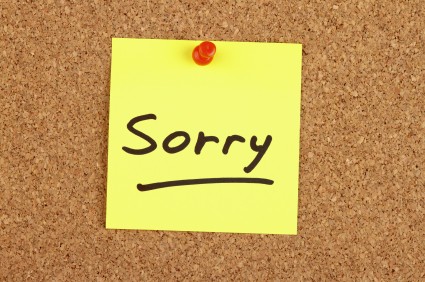
MANY PEOPLE find it hard to make apology in an organized public manner. This is mainly because most of us react emotionally or fear public speaking in general. In the event that you make a mistake that affects your employees or customers, it is always right to say that you are sorry. If, by chance, you do not apologize, the blame will still be upon you and your perspective will be undermined.
For some managers or business owners, the hardest part of making a public apology is admitting that you made a mistake in front of subordinates or clients. For others, making public statements in general inflict paralyzing fear. Here’s the bottom line: think about the perspective of your audience. What would you respect more? The business owner who owned up and apologized so that he or she could get back to business honorably, or the business owner who cowered from admitting they were wrong? Aside from being made to feel like I wasn’t worth the apology to the business owner, I would also be wondering if the business owner even knew what he or she did wrong. Beyond that, if I don’t know that they know what they did wrong, what faith do I have that the mistake will never happen again? Do the right thing and apologize. We all make mistakes and we all know it. It’s not about trying to cover up the mistake—it’s about damage control and recovery.
When apologizing, it is important to be specific without bringing unnecessary issues to the table. When you’ve assembled your audience, explain the situation, articulate your position, explain your actions, then finally, articulate your recovery plan or how you plan to make it right. An effective public apology does not involve past or unresolved issues. You don’t necessarily have to ask for forgiveness. Just tell your audience what you plan to do to make it right, thank them for their time, and tell them to carry on. If your mistake involved employees, my recommendation is that you call a company meeting (if you can fit everyone in one place; conference room, meeting hall, etc.) and apologize in person. If your company is too big and you have to send an email, ensure that your message is candid, heartfelt and sincere. Time is a factor to consider while making public apology. When prolonged, the situation just tends to get worse.
Apologizing to customers can be a whole different matter as they don’t have to do business with you anymore. Employees, on the other hand, still depend on you for work. When apologizing to customers, be prepared to offer something to patch things up. Free products or services, a cash refund, a generous discount, etc. While some say that the apology is the first step in solving any conflict, I believe that developing a recovery plan is the first step. In business, you can’t extend a full apology without including an explanation of how you plan to make it right.






















